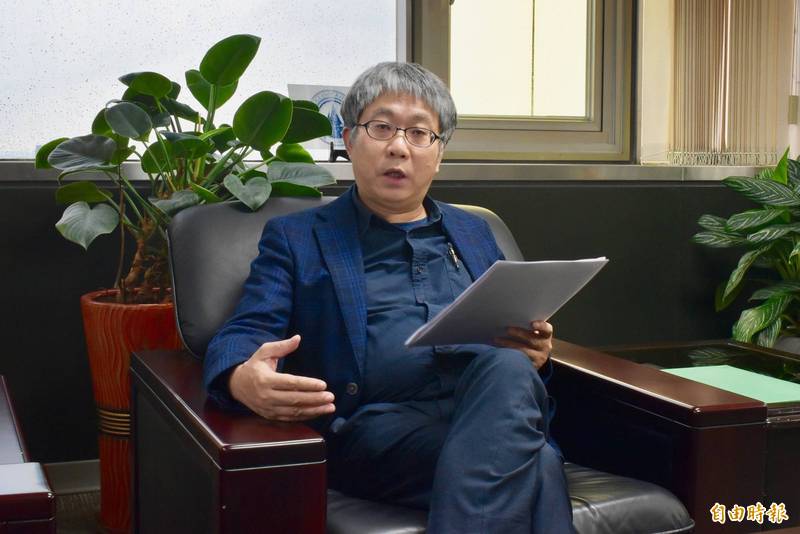《TAIPEI TIMES》 Taiwan to team up with smaller EU nations

Deputy Minister of Science and Technology Lin Minn-tsong sits for an interview with the Taipei Times on Aug. 3 Photo: Lin Chia-nan
AGREEMENTS: Deputy Minister of Science and Technology Lin Minn-tsong said Taiwan has many mutually beneficial opportunities with central and eastern European nations
By Lin Chia-nan / Staff reporter
The Ministry of Science and Technology said it is seeking to bolster cooperation in space technology, autonomous driving and biomedicine with central and eastern European countries.
On a visit to Taiwan this year, a Slovak delegation is to sign a memorandum of understanding (MOU) for cooperation with the Taiwan Space Industry Development Association and visit the National Space Organization (NSPO) at the Hsinchu Science Park (新竹科學園區), Deputy Minister of Science and Technology Lin Minn-tsong (林敏聰) said in an interview with the Taipei Times on Aug. 3, as he elaborated on the ministry’s plans.
The NSPO and the Polish Academy of Sciences plan to convene a seminar on the development of space exploration instruments later this year, Lin added.
Last year, three Czech institutions signed MOUs with the NSPO, and academics from the two nations had preliminary discussions about Taiwan’s space exploration program, he said.
Taiwan and the Czech Republic cooperate on the material sciences, smart agriculture, biotechnology and information security, he said.
The ministry is helping Taiwanese academics work with the UN’s International Research Center on Artificial Intelligence in Slovenia, which officially opened in March, he said.
Taiwan has many mutually beneficial opportunities with central and eastern European countries, which require a different strategy from cooperation with big powers such as the US and Germany, he said.
Lin said that he witnessed the transformation of central and eastern Europe as he pursued master’s, doctoral and postdoctoral studies in Germany in the 1980s and 1990s.
In the 1990s, the countries gained their sovereignty and underwent democratization, and have eagerly pursued technological advancement, Lin said.
Technological development and national security are linked, he said, adding that strategic thinking is required to protect core technologies while opening up to the world.
For example, Taiwan’s semiconductor industry owns advanced manufacturing technologies, but the industry must source key materials and equipment from other countries, he said.
When local industries invest in other countries, it is essential to protect certain core technologies, while sharing resources with partners, Lin added.
The ministry is eager to develop smart driving technology, so it is seeking to collaborate with Hungary’s ZalaZone Automotive Proving Ground, he said.
On Friday last week, Representative to Hungary Liu Shih-Chung (劉世忠) led a delegation to visit the testing facility, which is the biggest testing ground in Europe for self-driving vehicles.
In 2019, Taiwan established its first closed testing ground for self-driving vehicles — called the Taiwan CAR (connected, autonomous and road-test) Lab — in Tainan, which is operated by the National Applied Research Laboratories.
In April, Minister of Science and Technology Wu Tsung-tsong (吳政忠) invited a delegation of 34 foreign ambassadors and business representatives to tour the testing ground and other facilities in Tainan and Kaohsiung.
For more than two decades, Taiwan has cooperated with Lithuania and Latvia on technology, primarily through a trilateral program based on an agreement signed in 2000, the ministry said.
The program has funded more than 60 projects, including nine biotechnology projects and seven engineering projects that involve lasers, information and semiconductors, it said.
Since 2002, the three nations have hosted annual conferences on technological cooperation, it said.
Last year’s conference was to take place in Vilnius, but was changed to a videoconference due to the COVID-19 pandemic, the ministry said.
This year’s conference is to be hosted by Taiwan, but whether it is in person or virtual depends on the virus situation, Lin said.
The ministry is also considering a call for wider international cooperation on some larger projects, he said.
Precision medicine, including brain science, and space technology are priorities for the ministry, which would announce the projects soon, Lin added.
新聞來源:TAIPEI TIMES















